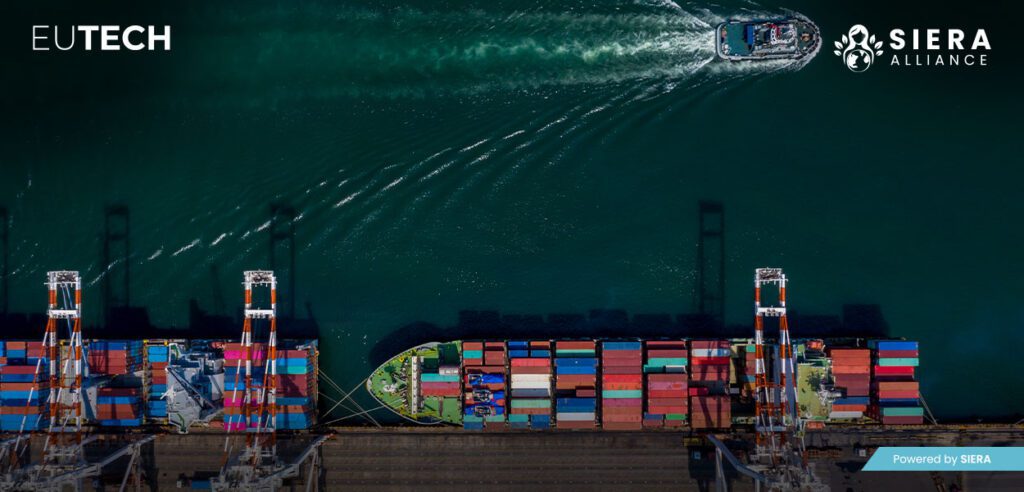Why Ethical Labor Practices Are Crucial in Transport Supply Chains
The transport and logistics sector is a vital link in global supply chains, employing millions worldwide. However, the industry faces persistent challenges, including labor exploitation, poor working conditions, and supply chain transparency issues. Adopting ethical labor practices is no longer optional—it is essential for aligning with corporate social responsibility (CSR), fostering sustainable supply chain management, and maintaining competitive advantage.
On 11th October 2024, the EUTECH – Transport & Logistics Council powered by SIERA Alliance hosted a webinar titled “Ensuring Ethical Labor Practices in Transport Supply Chains.” Moderated by SIERA Alliance, the event featured keynote speaker Prachi Shahare, a SIERA sustainability consultant, alongside panelists Dr. Stefan Blachfellner and Mercedes Martin Fernandez. The discussion explored challenges, solutions, and the transformative potential of ethical labor standards in supply chains.
Key Challenges in Ethical Labor Practices
The panelists identified five pressing challenges in the transport supply chain industry:
1. Skilled Labor Shortage
Europe faces a deficit of 230,000 truck drivers, projected to exceed 745,000 by 2030 due to an aging workforce and insufficient new entrants. This shortage strains existing workers, causing inefficiencies and safety risks.
2. Poor Warehouse Conditions
Many logistics facilities suffer from inadequate ventilation, long hours, and safety violations, leading to lower productivity and worker dissatisfaction.
3. Labor Exploitation in Cross-Border Logistics
Migrant workers in cross-border logistics often face wage disparities, contract violations, and poor legal protections. This exploitation undermines the industry’s ethical standards.
4. Inadequate Worker Safety
The EU transport sector reported over 5,000 serious injuries in 2020 due to inadequate safety protocols. Infrastructure projects with heavy machinery pose additional risks.
5. Gender Imbalance and Inclusion
Women comprise only 22% of the transport workforce, with even lower representation in land and water transport sectors. Addressing this disparity is vital for creating inclusive workplaces and fostering innovation.

Solutions and Strategies for Ethical Supply Chains
The panel provided practical solutions to address these challenges:
1. Implement Mobility Hubs
Investing in sustainable mobility hubs creates safe, well-equipped environments for workers. These hubs promote fair wages, better working conditions, and skills training, reducing turnover and improving workforce stability.
2. Leverage Smart Technologies
Using digital twins and real-time monitoring optimizes warehouse conditions, enhances worker safety, and ensures compliance with ethical labor practices. These technologies also improve energy efficiency, aligning with sustainability goals.
3. Adopt Robust Reporting Frameworks
Transparency is key to supply chain governance. Adopting sustainability reporting frameworks ensures compliance with international labor standards, particularly in cross-border logistics.
4. Promote Modern Safety Protocols
Regular safety audits and training programs reduce workplace accidents. Implementing protocols for high-risk infrastructure projects ensures worker safety and operational efficiency.
5. Encourage Gender Diversity
Initiatives to recruit and retain women in leadership roles improve workplace inclusivity. Companies focusing on ethical sourcing and fair labor standards build more dynamic and innovative teams.
Transformation Opportunities in Transport Supply Chains
Implementing ethical labor practices offers significant transformation opportunities:
| Transformation Area | Benefits | Impact |
| Reduced Turnover | Improved facilities and worker conditions increase employee retention. | Companies investing in mobility hubs reduce turnover by 15-20%. |
| Enhanced Reputation | Strong ethical practices attract investors and customers. | Companies adhering to ethical standards secure contracts more easily. |
| Boosted Productivity | Real-time monitoring reduces accidents and improves worker satisfaction. | Safety improvements enhance productivity by up to 25%. |
| Stronger Compliance | Adherence to labor laws minimizes legal risks. | Compliance with ESRS S2 enhances brand reputation. |
| Innovation Through Diversity | Diverse teams foster creativity and problem-solving. | Companies promoting gender diversity report a 20% rise in innovation. |

Best Practices for Ethical Labor in Transport Supply Chains
- Conduct Regular Audits: Audits ensure compliance with workplace safety regulations and identify areas for improvement in labor practices.
- Collaborate with Suppliers: Engage suppliers to align with ethical supply chain management goals, ensuring adherence to fair trade practices.
- Educate and Train Employees: Regular training on workplace safety guidelines and ethical business practices improves worker awareness and compliance.
- Utilize Digital Tools: Integrate digital solutions to enhance supply chain transparency and monitor compliance in real time.
Upcoming Events and Opportunities
Stay updated on future events hosted by the EUTECH Transport & Logistics Council powered by SIERA Alliance. For further insights into ethical practices and networking opportunities, explore the SIERA Alliance Event Calendar. Join us in advancing sustainability and responsibility in supply chains.
Conclusion: Driving Sustainability Through Ethical Labor Practices
Adopting ethical labor practices in transport supply chains is not just a regulatory requirement—it’s a pathway to operational excellence, worker well-being, and sustainable growth. By leveraging smart technologies, fostering inclusion, and ensuring transparency, companies can build resilient, ethical supply chains that benefit both people and the planet. Collaborating with organizations like SIERA Alliance and EUTECHenables firms to implement impactful solutions that benefit workers and drive long-term success.
To learn more about how SIERA Alliance can support your journey toward sustainable supply chain management, visit our website. Join us in building a responsible future for global logistics.









